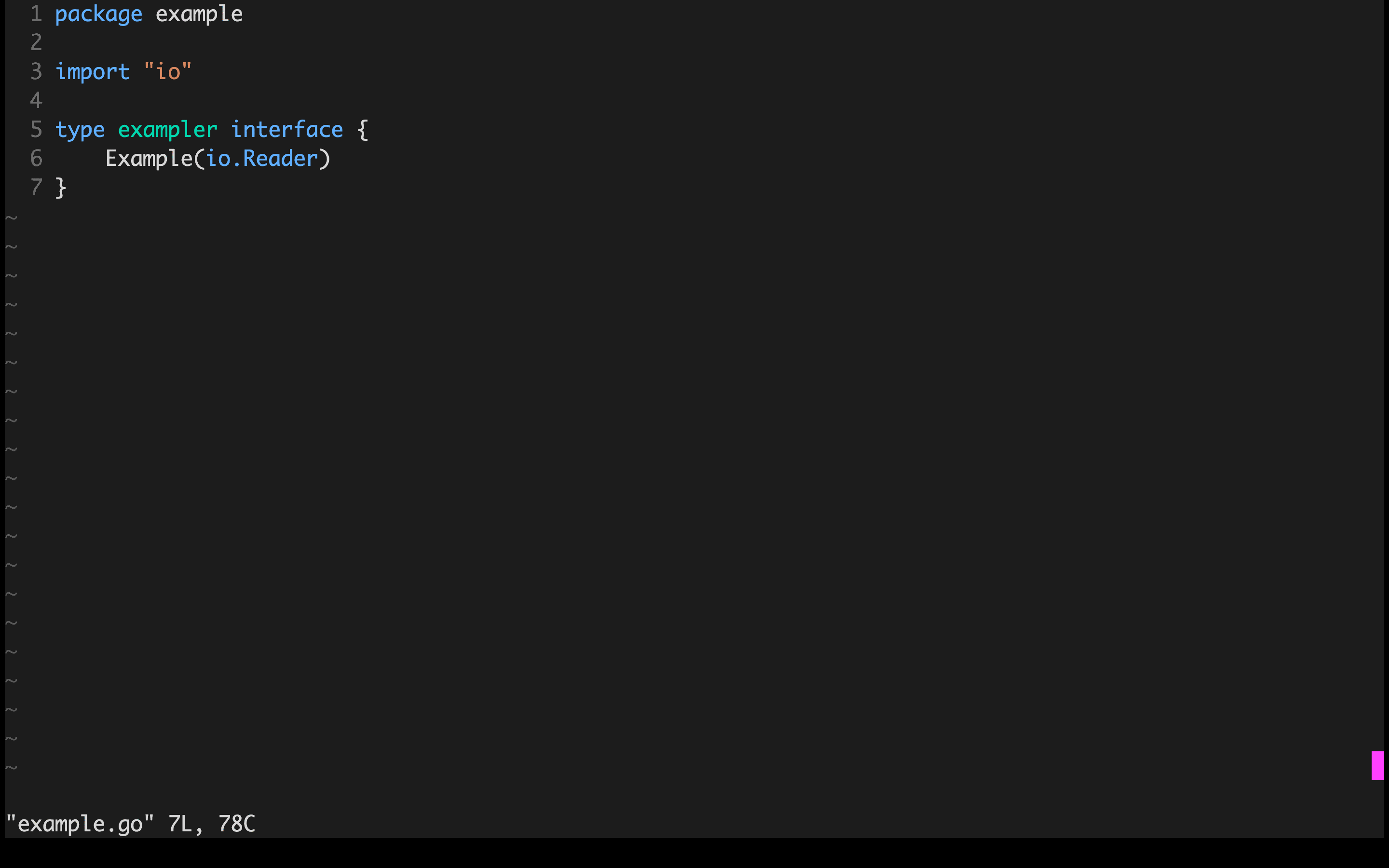
单元测试作为一种强大的工具,可以检查代码各个方面的行为。如果对进行代码测试十分重视,那么您将会一直编写可持续、可维护的代码,并且在代码的实现过程中保持代码的完整性。依赖于抽象的、经过开发者精心设计的代码是很容易进行测试的,所以代码的可测试性也作为其质量的一个指标。
如果您已经在 Go 中尝试过测试代码,您可能知道接口的巨大作用。在 Go 的标准库中,提供了一系列接口,这些接口大多数只包含一个方法,您可以使用这些接口。
Go 还有一个补充框架,用以模拟接口。同时,还有一些社区驱动的包可以完成类似的功能。他们中的大多数都可以根据给定接口,生成实现这些接口的 struct。对于较大的接口,或者嵌套了其他接口,使用这种方式很有效。当接口只有一个方法时,不是更有效果吗?
关于 Go 中的接口,最令人惊讶的部分是它的默认满足性。任何类型,只需要提供其签名与接口声明中的方法匹配的实现,即可以满足该接口。这种类型甚至可以是函数,如果您熟悉 net/http 包,你也可能看到其中的一种可以叫做 adapters 的类型。
// A Handler responds to an HTTP request.
type Handler interface {
ServeHTTP(ResponseWriter, *Request)
}
// The HandlerFunc type is an adapter to allow the use of
// ordinary functions as HTTP handlers. If f is a function
// with the appropriate signature, HandlerFunc(f) is a
// Handler that calls f.
type HandlerFunc func(ResponseWriter, *Request)
// ServeHTTP calls f(w, r).
func (f HandlerFunc) ServeHTTP(w ResponseWriter, r *Request) {
f(w, r)
}
如上述代码,adapters 类型本身是一个函数类型,而且具有与接口方法声明相同的签名,它通过在对应方法中调用自身,实现了接口。这个适配器允许具有适当签名的任何函数来实现 Handler 。它作为一种模拟接口的通用工具,看起来在表驱动的测试中十分有用。例如,需要测试以下代码:
package execute
import (
"errors"
"fmt"
"io"
)
var (
// ErrExpectedError return when error is expected.
ErrExpectedError = errors.New("expected error")
)
// Doer does some job.
type Doer interface {
Do() (jobID int, err error)
}
// Execute executes Doer interface and handles errors.
func Execute(job Doer, w io.Writer) {
id, err := job.Do()
if err != nil {
switch err {
case ErrExpectedError:
fmt.Fprintf(w, "%v\n", err)
default:
fmt.Fprintf(w, "unexpected error: %v\n", err)
}
return
}
fmt.Fprintf(w, "job %d done\n", id)
}
使用 adapter 的单元测试如下:
package execute
import (
"bytes"
"errors"
"testing"
"github.com/stretchr/testify/assert"
)
func Test_Execute(t *testing.T) {
tests := []struct {
name string
doFunc func() (int, error)
wantErr bool
expect string
}{
{
name: "expected error",
doFunc: func() (int, error) {
return 0, ErrExpectedError
},
expect: "expected error\n",
},
{
name: "unexpected error",
doFunc: func() (int, error) {
return 0, errors.New("mocked error")
},
expect: "unexpected error: mocked error\n",
},
{
name: "job done",
doFunc: func() (int, error) {
return 333, nil
},
expect: "job 333 done\n",
},
}
for _, tt := range tests {
tt := tt
t.Run(tt.name, func(t *testing.T) {
t.Parallel()
var buf bytes.Buffer
Execute(doerFunc(tt.doFunc), &buf)
assert.Equal(t, tt.expect, buf.String())
})
}
}
type doerFunc func() (int, error)
func (f doerFunc) Do() (int, error) {
return f()
}
编写这样的 adapters 十分繁杂,所以我决定编写一个工具来生成代码,叫做 adapt 。使用这个工具可以对一个指定接口生成 adapters ,并且打印其输出。你所需要做的工作就是,传入一个包名和接口名来生成代码。
$ adapt io Reader
type readerFunc func([]byte) (int, error)
func (f readerFunc) Read(p []byte) (int, error) {
return f(p)
}
也可以在包中的文件夹内部,使用 adapt 工具为包中的一些接口生成适配器。
$ cd $GOPATH/src/github.com/x/execute Doer
$ adapt Doer
type doerFunc func() (int, error)
func (f doerFunc) Do() (int, error) {
return f()
}
也可以和一个便捷的 vim 插件 配合使用,可以再 vim 中直接调用该工具。

希望您会发现它很有用!
via: https://itnext.io/yet-another-tool-to-mock-interfaces-in-go-73de1b02c041
作者:Roman Budnikov 译者:kobeHub 校对:polaris1119
本文由 GCTT 原创翻译,Go语言中文网 首发。也想加入译者行列,为开源做一些自己的贡献么?欢迎加入 GCTT!
翻译工作和译文发表仅用于学习和交流目的,翻译工作遵照 CC-BY-NC-SA 协议规定,如果我们的工作有侵犯到您的权益,请及时联系我们。
欢迎遵照 CC-BY-NC-SA 协议规定 转载,敬请在正文中标注并保留原文/译文链接和作者/译者等信息。
文章仅代表作者的知识和看法,如有不同观点,请楼下排队吐槽
有疑问加站长微信联系(非本文作者))








